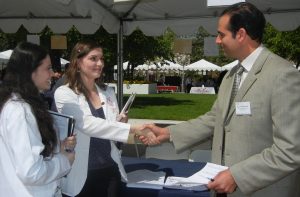With the landscape of healthcare changing, USC Mann has undertaken a thorough review of its pharmacy curriculum to ensure that graduates are fully prepared for the challenges of 21st century practice. The School’s faculty recently approved a slate of curricular changes that will next be presented for university review.
In February 2014, specific outcomes were identified and approved by the faculty. In order to meet the outcomes, faculty recognized the need for curricular changes.
 “Our curriculum is very strong,” said Curriculum Committee Chair Ian Haworth . “Our goal is to further strengthen it to ensure that our students graduate with the foundational knowledge they need as well as the professional skills and scholarly approach that today’s diverse workplace requires.”
“Our curriculum is very strong,” said Curriculum Committee Chair Ian Haworth . “Our goal is to further strengthen it to ensure that our students graduate with the foundational knowledge they need as well as the professional skills and scholarly approach that today’s diverse workplace requires.”
Haworth, an associate professor of pharmacology and pharmaceutical sciences, has mapped the current curriculum, providing a graphic representation of what students learn and when they learn it. This visual made it easier to recognize points where changes will improve the learning experience.
“Many of our proposed changes will promote connectivity throughout the educational process,” said Haworth. “Foundational knowledge will be built on, giving students a better understanding of its application in therapeutic practice.”
At the School’s biennial faculty retreat last May, Haworth and his committee colleagues Kathleen Besinque and Melissa Durham presented principles surrounding the curricular changes to the faculty for consideration. The changes allow students additional time to pursue a scholarly project during their pharmacy school years and opened up slots for classes focused on professional skills and electives.
 “We want to give students an opportunity to explore in-depth areas of pharmacy that interest them,” said Besinque who is the assistant dean of curriculum and assessment. “Our intent is to reduce in-class time and increase elective and experiential opportunities. In fact, students will have experiential time during every semester.”
“We want to give students an opportunity to explore in-depth areas of pharmacy that interest them,” said Besinque who is the assistant dean of curriculum and assessment. “Our intent is to reduce in-class time and increase elective and experiential opportunities. In fact, students will have experiential time during every semester.”
The faculty was convinced and approved the changes that promise to produce pharmacists who are capable of navigating the evolving healthcare landscape and preparing them for diverse careers that pharmacy professionals fill. The changes also reflect many of the outcomes stated in the latest version of the Center for the Advancement of Pharmacy Education (CAPE) report which was published in 2013. CAPE is a center within the American Association of Colleges of Pharmacy which aims to guide schools nationwide on curricular issues.
The CAPE outcomes focus on four areas including foundational knowledge, practice and care essentials, practice and care approach, and personal and professional development. The overriding premise of CAPE is to prepare pharmacists who can function as part of an interprofessional team, advocate for and provide care to diverse populations, educate a broad range of constituents, and manage and lead in a highly technical workplace.
 “The 2013 CAPE Outcomes reflect an emphasis on social and interpersonal skills such as professionalism, empathy, self-awareness, and leadership,” explained Melissa Durham. “Our redesigned curriculum will include new courses throughout the four years focusing on the personal and professional development of our students, teaching them that being a healthcare provider truly is a social practice as much as it is a scientific practice.” Durham is an assistant professor and the director of introductory pharmacy practice experience programs at the School.
“The 2013 CAPE Outcomes reflect an emphasis on social and interpersonal skills such as professionalism, empathy, self-awareness, and leadership,” explained Melissa Durham. “Our redesigned curriculum will include new courses throughout the four years focusing on the personal and professional development of our students, teaching them that being a healthcare provider truly is a social practice as much as it is a scientific practice.” Durham is an assistant professor and the director of introductory pharmacy practice experience programs at the School.
“USC Mann has always had an eye on innovation in education and practice,” said Dean R. Pete Vanderveen. “I’m pleased that our faculty is moving forward on these changes so that our students will be even better prepared to meet the challenges of the future where change is inevitable.”
The proposed changes will next be presented for university approval later this year. The School aims to have the new curriculum in place by fall 2015.

